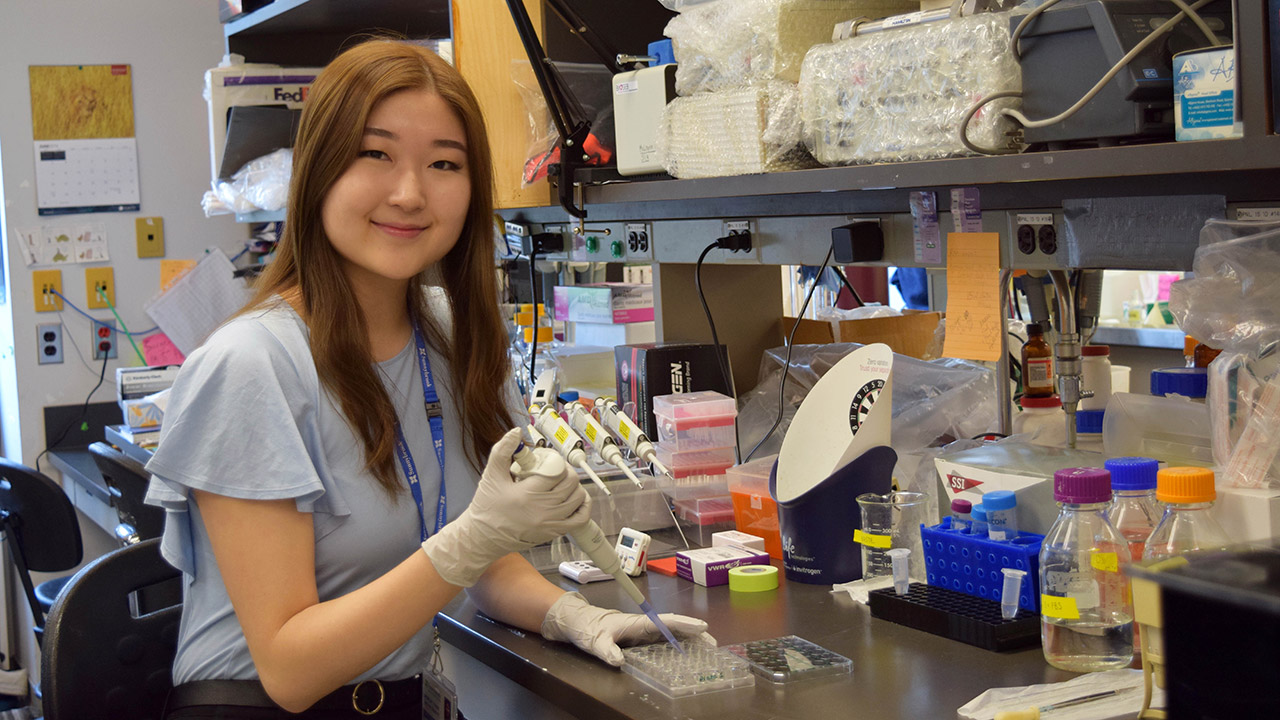A meaningful connection
Some university students, unsure where their interests lie, meander through courses and programs, trying to find their calling. Not so for Shirley Yang. “Science has been my passion since I was little. I knew I didn’t want to do anything else,” says Yang, who is going into her second year of the medical sciences program at Western University in London, Ont.
It’s unsurprising, then, that instead of soaking up the sun, Yang is spending her time off in the Summer Student Research Program at Sunnybrook Research Institute (SRI). The program, which runs from May through August, provides undergraduates with hospital-based research experience and a glimpse into careers in science.
Keen to do hands-on work in a lab, Yang began researching summer internships in her last year of high school and got a jump on the application process. “In my first year, I knew about the opportunity at SRI, and I knew I really wanted to do it. I started thinking about it and applying early on, emailing scientists and researchers,” she says.
Her planning paid off. She is working in the lab of Dr. JoAnne McLaurin, a senior scientist in Biological Sciences at SRI and the Canada Research Chair in Alzheimer Therapeutics. It is Yang’s first time working in a lab. Her project is looking at the effects of high blood pressure on animals that are susceptible to developing Alzheimer’s disease.
Under the guidance of McLaurin, as well as PhD students in the lab, Yang is studying preclinical models that have been injected with human genes that cause them to make too much amyloid precursor protein. This protein generates beta-amyloid plaque, a hallmark of Alzheimer’s disease. “I’m specifically looking at the pathology to see the effects of hypertension on the brain tissue in rats that are susceptible to the disease,” she says. She is looking at how blood vessels in the brain change in terms of their structure and reactivity—namely, if they are getting stiffer or looser, or wider or thinner, in response to a stimulus.
Before she could run any experiments, however, Yang had to be trained on working with microscopes and using a pipette, a syringe-like tool used to measure and dispense liquid accurately. She says that learning such techniques has been valuable, but what has really been eye-opening is being part of a lab. She has been struck by the cooperation and camaraderie among her lab mates. When asked if the studentship is panning out the way she had thought it would do, Yang says, “It is what I thought it would be, but it’s also a lot better, because I didn’t realize I’d be surrounded by such nice, helpful people. I thought everyone would be really busy, and they do have a lot of work to do, but everyone is so willing to help you learn.”
Outside of work, Yang exercises a different skill set. “I’m really big on art. I enjoy sketching, painting and water colour. [Art] uses a different part of your brain, so it’s kind of relaxing,” she says.
The summer studentship has solidified her plan to pursue a career in science. Like the best life experiences, though, it has also taught her about herself. “I always thought I was a fairly organized person, a very hardworking person, and a little bit of a perfectionist. I see those aspects coming out as I’m working here. I like to keep things as orderly as possible, but I am learning that I have a lot of room to grow—especially seeing all of these PhD students and people who are very skilled at what they do. With respect to organization, they all know what they’re doing, and have specific ways that work for them. I’m starting to learn their techniques and changing them to things I can use, which is great.”
In a nutshell
- Shirley Yang is a summer research student supervised by SRI senior scientist Dr. JoAnne McLaurin.
- Using preclinical models, she is examining the role of high blood pressure in the development of Alzheimer’s disease.
- Her positive experience in the lab is reinforcing her desire to pursue a career in science.



